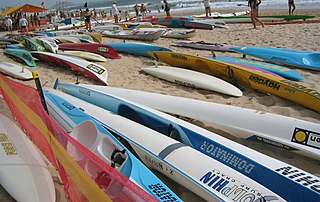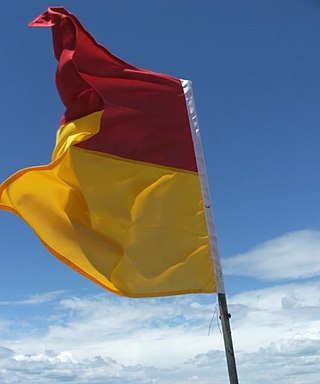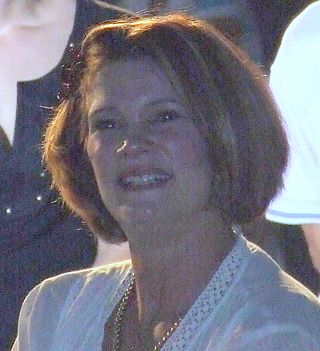Related Research Articles

Surf lifesaving is a multifaceted social movement that comprises key aspects of voluntary lifeguard services and competitive surf sport. Originating in early 20th century Australia, the movement has expanded globally to other countries, including New Zealand, Ireland, South Africa, and the United Kingdom. Surf lifesavers in Australia are colloquially known as "Clubbies".

A lifeguard is a rescuer who supervises the safety and rescue of swimmers, surfers, and other water sports participants such as in a swimming pool, water park, beach, spa, river and lake. Lifeguards are trained in swimming and CPR/AED first aid, certified in water rescue using a variety of aids and equipment depending on requirements of their particular venue. In some areas, lifeguards are part of the emergency services system to incidents and in some communities, lifeguards may function as the primary EMS provider.
The Royal Life Saving Society UK is a drowning prevention charity founded in 1891 in the UK. It has had Royal Patronage since 1904.

Tracey Lee Wickham is an Australian former middle distance swimmer. Wickham was the World Champion for the 400 m and 800 m freestyle in 1978, and won gold in both events at the 1978 and 1982 Commonwealth Games. She is a former world record holder for the 400 m, 800 m and 1500 m freestyle. Despite her success in the pool, Wickham has battled hardship and personal tragedy throughout her life.

The International Life Saving Federation (ILS) is an organisation for drowning prevention, water safety, lifesaving and lifesaving sports.

The Royal Life Saving Society Canada, commonly known as the Lifesaving Society or LSS, is a Canadian registered charity that works to prevent water-related injuries through various programs across Canada. The Lifesaving Society is an independent organization that is composed of ten provincial/territorial branches, tens of thousands of individual members, and over 4,000 affiliated swimming pools, waterfronts, schools and clubs. The Society helps prevent drowning and aquatic injury through its training programs, public education, drowning-prevention research, safety management and overseeing the sport of lifesaving.

Lifesaving is the act involving rescue, resuscitation and first aid. It often refers to water safety and aquatic rescue; however, it could include ice rescue, flood and river rescue, swimming pool rescue and other emergency medical services. Lifesaving also refers to sport where lifesavers compete based on skills, speed and teamwork. Lifesaving activities specialized in oceanic environment is called surf lifesaving or coastal lifesaving.
The British Universities Lifesaving Clubs' Association (BULSCA) is the governing body for lifesaving sport at the University level in the United Kingdom. It organises the university-level competition schedule, assists with the training of judges, and hosts an annual Student National Championship. BULSCA organises competitions in England, Scotland, and Wales and also includes member teams from Northern Ireland and Ireland. In recent years the club has also been represented at international competition, including the Grand Prix Moravie held in Brno, Czech Republic. For the years 2018/2019 and 2019/2020 the BULSCA championships at Swansea and Bristol respectively also played host to a team representing Greek Universities.
The ILS World Life Saving Championships are the world championships for lifesaving sport events. They are sanctioned by the International Life Saving Federation (ILS), conducted every 2 years, and commonly marketed and known as the ‘Rescue’ series, for example – Rescue 2008.
The 1988 Lifesaving World Championships were held between 22–27 March 1988 at the Gold Coast, Queensland, Australia.

Chad Guy Bertrand le Clos, OIS is a South African competitive swimmer who is an Olympic, World and Commonwealth Games champion. He is the African record, Commonwealth record, and South African record holder in the short course and long course 200-metre butterfly and the short course 100-metre butterfly. He also holds the African records and South African records in the long course 200-metre freestyle and 100-metre butterfly, and the short course 100-metre freestyle. Formerly, he was a world record holder in the short course 100-metre butterfly and 200-metre butterfly.
The lifesaving events at the 2009 World Games in Kaohsiung was played between 23 and 25 July. 96 athletes from 8 nations participated in the tournament. The competition took place in Kaohsiung Swimming Pool for pool events and in Sizihwan Bay for beach events. For both men and women, there were four individual events in pool lifesaving, three individual events in beach lifesaving, and an overall team event combining five non-medal team and relay events in pool and beach disciplines.
Sport diving is an underwater sport that uses recreational open circuit scuba diving equipment and consists of a set of individual and team events conducted in a swimming pool that test the competitors' competency in recreational scuba diving techniques. The sport was developed in Spain during the late 1990s and is currently played mainly in Europe. It is known as Plongée Sportive en Piscine in French and as Buceo De Competición in Spanish.

Lifesaving South Africa (LSA) is a South African organisation that promotes water safety and provides surf rescue services. LSA is a founding member organisation of the International Life Saving Federation, and a member of Royal Life Saving Society. It is recognised by SRSA and SASCOC.
Rebecca Meder is a South African swimmer. She is the African record holder in the 100 metre individual medley and the South African record holder in the long course and short course 200 metre individual medley. At the 2022 World Short Course Championships, she placed sixth in the final of the 100 metre individual medley. In the 200 metre individual medley at the 2022 Commonwealth Games, she placed fourth in the final. At the 2021 African Championships, she won 11 gold medals, six in individual events and five in relay events, swimming on the finals relay for each of the five relay events.

Lifesaving is an official discipline of the World Games, the Games with all the sports, recognized by the IOC but not yet in the Olympic program.

The lifesaving events at the 2001 World Games in Akita was played between 24 and 26 August. 90 athletes from 9 nations participated in the tournament. The competition took place in Akita Prefectural Pool for pool events and in Iwaki Island Park for beach events. For both men and women, there were four individual events in pool lifesaving, three individual events in beach lifesaving, and an overall team event combining five non-medal team and relay events in pool and beach disciplines.
Brendon Smith is an Australian swimmer. He won the bronze medal in the 400 metre individual medley at the 2020 Summer Olympics and has competed in the Summer Universiade and the 2021 Australian Swimming Trials.
Matthew "Matt" Sates is a South African swimmer. He is the African record holder in the short course 200 metre freestyle, 400 metre freestyle, and 200 metre individual medley as well as the South African record holder in the 400 metre individual medley. He is the 2022 World Short Course champion in the 200 metre individual medley and bronze medalist in the 400 metre individual medley. At the 2022 NCAA Division I Championships, he won the NCAA title in the 500 yard freestyle. For the 2021 FINA Swimming World Cup, he was the overall male winner, earning a total of 18 medals including 13 gold medals.
Lani Pallister is an Australian competitive swimmer. She is a world record holder in two sports, with a world record in swimming, the short course 4×200-metre freestyle relay, and world records in life saving for the youth age group in the 100-metre rescue medley and 200-metre super lifesaver. She holds the Oceanian, Commonwealth, and Australian records in the short course 1500-metre freestyle and the Australian record in the short course 800-metre freestyle. She is the first female World Short Course champion in the 1500-metre freestyle, winning the inaugural event for women at the 2022 edition. Over the course of the 2022 World Short Course Championships, she won the gold medal in each of the four events she contested.
References
- ↑ '2011 Commonwealth Lifesaving Championships,' "Royal Life Saving Society > 2011 Commonwealth Lifesaving Championships". Archived from the original on 2011-10-08. Retrieved 2012-08-29., retrieved 29/08/2012.
- ↑ "Save the date - Commonwealth Lifesaving Championships 2013 - Royal Life Saving". Archived from the original on 2020-11-04. Retrieved 2020-11-01.
- ↑ COMMONWEALTH LIFESAVING CHAMPIONSHIPS 2013, "Archived copy" (PDF). Archived from the original (PDF) on 2014-08-08. Retrieved 2012-08-29.
{{cite web}}: CS1 maint: archived copy as title (link), retrieved 29/08/2012.